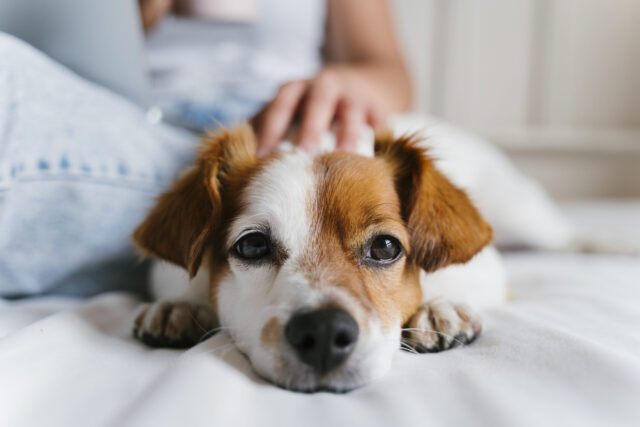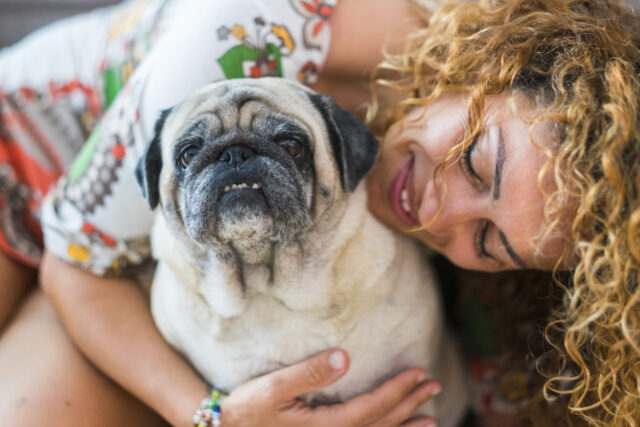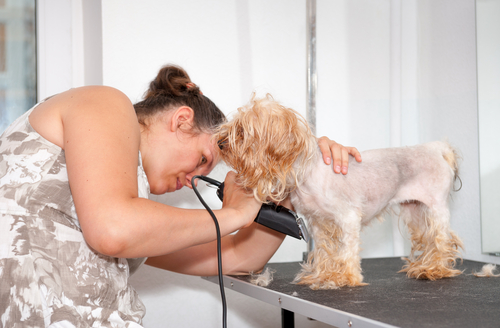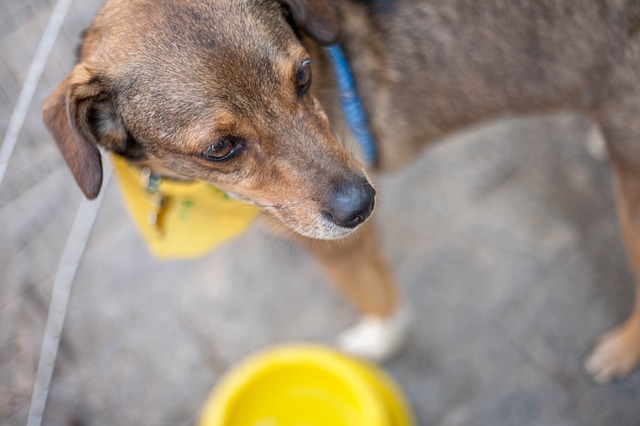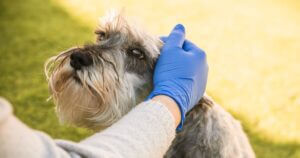
Introduction
On March 11, 2020, the World Health Organization declared the COVID-19 outbreak a global pandemic. As panic and misinformation continue to spread along with the virus, many pet parents are concerned about what this may mean for their dogs.
In order to answer your questions and help allay your fears, we have created a comprehensive guide to caring for dogs during the coronavirus pandemic. While they are not the ones getting sick, this crisis is definitely affecting their lives. As their caretakers, it is up to us to ensure they stay safe and continue to have their needs met.
This post focuses on the most current information as of April 13, 2020. Be sure to stay up to date with local, state, and federal protocols, as well as ever-changing health recommendations as we continue to learn more about COVID-19.
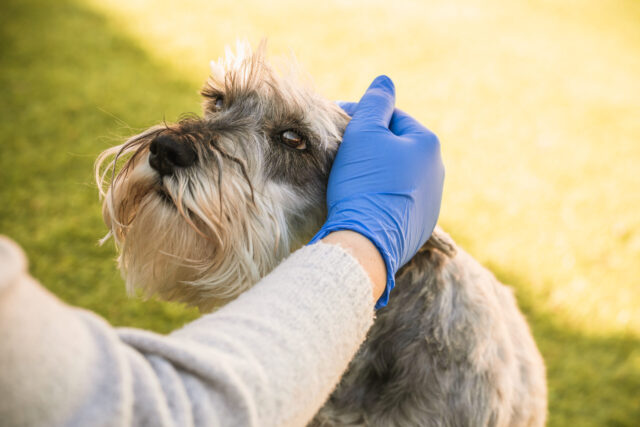
TABLE OF CONTENTS
What Does COVID-19 Mean For Dogs?
- Facts From The CDC
COVID-19 & Veterinary Care
- Is Vet Care Considered Essential?
- How Vet Visits Work During The COVID-19 Pandemic
- What If I Can’t Get To The Vet?
- Routine Vet Care
- Grooming
Indoor Safety Tips
- CDC Recommendations
- If You Become Sick With COVID-19
Going Outside With Your Dog
- Is It OK To Go For Walks?
- Can We Go To The Dog Park?
- Can I Play With My Dog Outside?
- What About Dogs Under Mandatory Quarantine?
Working From Home With Your Dog
- Exercise First
- Take Frequent Breaks
- Keep Them Busy
- Try CBD
Preparing For A Potential Emergency
- Designate An Emergency Caregiver
- Create A Doggy Dossier
- Ensure Proper ID
- Stock Up On Necessary Supplies
- Financial Concerns
Health Benefits Of Having A Dog
Is It Safe To Foster/Adopt A New Dog?
What Does COVID-19 Mean For Dogs?
The Centers for Disease Control and Prevention (CDC), World Health Organization (WHO), and other experts agree there is no evidence companion animals can spread the COVID-19 virus. Therefore, “there is no justification in taking measures against companion animals which may compromise their welfare.”
The CDC lists the following points to help pet parents understand the circumstances:
- Coronaviruses are a large family of viruses. Some cause illness in people, and others cause illness in certain types of animals.
- Coronaviruses that infect animals can sometimes be spread to people, but this is rare.
- We do not know the exact source of the current outbreak of coronavirus disease (COVID-19). The first infections were linked to a live animal market, but the virus is now primarily spreading from person to person.
- The first case of an animal testing positive for the virus in the United States was a tiger that had a respiratory illness at a zoo in New York City.
- We do not have evidence that companion animals, including pets, can spread COVID-19 to people or that they might be a source of infection in the United States.
- CDC is aware of a very small number of pets outside the United States to be infected with the virus that causes COVID-19 after close contact with people with COVID-19.
- We do not have evidence to suggest that imported animals or animal products pose a risk for spreading the 2019 novel coronavirus in the United States.
- Further studies are needed to understand if and how different animals could be affected by COVID-19.
COVID-19 & Veterinary Care
If you have been in contact with your vet in the past month, you may have noticed their protocols have changed. While most have remained open to serve their clients, they are attempting to limit the number of animals they see. In addition, the way in which they provide care has changed significantly.
Is Vet Care Considered Essential?
Only a few states, including Maryland and Pennsylvania, have officially deemed veterinary practices “essential.” However, the American Veterinary Medical Association (AVMA) is actively working to ensure that vets can continue to provide critical services in their communities.
For the time being, veterinary clinics can decide whether or not they will remain open during the pandemic. Most have adjusted their hours, cut back on staff, and limited appointments to sick visits only. They have also drastically changed their protocols to ensure your safety as well as that of their staff and your pets.
How Vet Visits Work During The COVID-19 Pandemic
Since the COVID-19 pandemic began, I have had the chance to witness the changes in veterinary visits firsthand. Each clinic probably varies slightly in how they do things, but the goal is the same: to provide the best care for your pets while protecting everyone involved from unnecessary exposure.
My experience went like this:
Rather than simply heading into the lobby with my dog, I was asked to park in a numbered spot and call the front desk. After checking in by phone, a technician wearing a mask and gloves came to my car window to discuss the reason for my visit.
Next, they took my dog into the clinic to see the vet while I waited in the car. After his exam, the same technician returned with a printed treatment plan/estimate for me to approve. With my permission, they gave my dog the necessary treatments and medications.
One of the receptionists then called my cellphone and took a credit card payment as I waited for my dog to be returned to me. I never set foot inside the clinic or spoke to the vet until the follow-up call the next day. While this may not be ideal, it is a safe and efficient way to ensure our dogs continue to get the care they need while maintaining social distancing protocols.
Not sure if your dog needs to see a vet? Dr, Kathryn Primm describes 5 Symptoms You Should Take Seriously
What If I Can’t Get To The Vet?
Many people currently find themselves under mandatory or self-imposed quarantine. If you are following the directives of your city or protecting yourself from COVID-19 exposure, you may not be able to get to your vet’s office.
One option is to contact a vet who does house calls. They may be able to see your dog outside in a fenced yard or on a screened patio in order to limit exposure. As always, maintain at least six feet distance from any person who does not share your home.
In addition, the following links may help you deal with some common canine ailments at home. Please note: professional veterinary care should always be your first choice and is our recommendation whenever possible.
- 5 Home Remedies For Doggy Diarrhea
- Vomiting Causes & Treatments
- 6 Natural Remedies For Your Dog’s Itchy Skin
- Signs Your Dog Has An Ear Infection & How To Help
Routine Veterinary Care
Most veterinarians have limited their services to illness or injury-related complaints. Routine services like annual checkups and vaccinations are currently on hold. However, if you need to have services updated in order to board or travel with your dog, contact the clinic and explain your situation. They may make an exception. You may also continue to refill heartworm, flea & tick, and other medications by calling ahead, paying over the phone, and having them brought to your car when you arrive.
Dog Grooming
Most states have allowed “pet-related businesses” to remain open, but limit services to those considered “essential,” including pet supplies, veterinarians, and boarding facilities. Some groomers may still be practicing on a limited basis depending on how strict the shelter-in-place laws/non-essential business closures are in their state.
If you are not able to get your dog groomed by a professional at this time, here are a few tips for home grooming as well as a how-to video for giving your dog a sanitary trim.
Indoor Safety Tips
Although there is no evidence that suggests the coronavirus can be transmitted to or from your dog, you should always practice good hygiene when living with animals. This includes washing your hands thoroughly throughout the day and before and after direct contact with your pets, their food, waste, or supplies.
The CDC also recommends you:
- Avoid touching your eyes, nose, and mouth.
- Practice good pet hygiene and clean up after pets properly.
- Clean and disinfect frequently touched objects and surfaces.
- Talk to your veterinarian if you have questions about your pet’s health.
If you become sick with COVID-19 (either suspected or confirmed):
- Have another member of your household care for your dog if possible.
- Avoid contact with your pet including, petting, snuggling, being kissed or licked, and sharing food.
- If you must care for your pet or be around animals while you are sick, wash your hands before and after you interact with them.
Going Outside With Your Dog
While some areas of the world are imposing quarantines and curfews, the general consensus is that fresh air and exercise are good things during this uncertain time. Going outside to walk or play with your dog boosts your endorphin levels and helps keep you active when so many people are turning into couch potatoes.
Here are a few things to consider before you venture outside:
Is It OK To Go For Walks?
While going for walks around your own neighborhood is generally acceptable, dog owners should refrain from walking in large groups or meeting up with other pup parents. As much fun as it is to chat and interact with other dog owners, it is important to practice social distancing, even when outdoors. Try less-traveled streets or walking paths and consider going out at less busy times like early morning or after dark.
You can also minimize your risk of exposure by washing your hands thoroughly for at least 20 seconds before and after each walk. Consider carrying a travel-sized bottle of hand sanitizer just in case.
Can We Go To The Dog Park?
Unfortunately, dog parks are a no-no right now. It is simply too risky for dogs and humans to gather and interact in such confined spaces at this time.
Can I Play With My Dog Outside?
Outdoor play in fenced-in yards is not only acceptable, it’s encouraged. Just be sure to practice good hygiene by washing your hands before and after outdoor play. You should also wipe your dog’s paws with grooming wipes before coming back inside.
Those without a private outdoor space may have to settle for indoor games for the time being. We have provided several suggestions in the “Keeping Them Busy” section below.

What About Dogs Under Mandatory Quarantine?
Dogs in apartments under mandatory quarantine are going to need to do their business inside. Ettel Edshteyn, a certified trainer, says the easiest way to teach your dog to potty in your apartment is to act as if you are going outside.
She offered the following tips via The New York Times:
- Set up a designated potty area with pee pads, artificial grass, or sod patches.
- Stick to their normal potty times – after eating, after naps, etc.
- Put on their leash and grab the poop bags to show your dog this is business as usual.
- Walk them to the area where you want them to go.
- If they don’t do their business, return to your normal activities and watch for signs your dog needs to potty. Try again if they begin sniffing, circling or whining.
Working From Home With Your Dog
Many people find themselves working from home when they are used to reporting to an office. This can be a difficult adjustment, especially when your adorable dog is there to distract you!
The following tips will help keep you focused and your pooch happy:
Exercise First
I don’t know about you, but my dogs expect a walk first thing in the morning. Not only are the streets clearer before nine o’clock, an early walk helps tire out my dogs so I can get right to work when we get home. If you prefer to walk later in the day, consider a game of fetch or chase before you settle in with your laptop. Remember: a tired dog is a well-behaved dog!
Take Frequent Breaks
Research shows that office workers who take a five to 10 minute break every 75 to 90 minutes are more efficient. It helps refocus your mind and is good for your physical health, too. Remember, sitting is the new smoking!
Use that time to cuddle your pup, enjoy a quick yoga session together, or have a short game of fetch.
Keep Them Busy
While dogs prefer games they can play with their favorite human, there is a secret to getting them to play independently – treats! Try giving them a YumBone smeared with peanut butter or hiding their favorite small, smelly treats in a Sniff Diggy Nose Work Mat or Smart Dog Puzzle Treat Mat.
Sniffing out treats is a great way to provide mental stimulation and a bit of physical activity. Engaging your dog’s body and mind at the same time is a great way to stave off boredom and anxiety. It also gives you some peace and quiet so you can get your work done.
Need some more activity options? Check out 10 Clever Canine Enrichment Ideas You Can Easily Do At Home
Try CBD
Several dog trainers have noted an increase in canine behavior problems since the COVID-19 crisis began. They chalk it up to changes in routine and our dogs’ incredible perception when it comes to sensing our stress.
If exercise and mental stimulation aren’t enough to quell your dog’s anxious feelings, Cannanine CBD oil may provide some relief. It is safe, natural, and made in the USA from 100% organic Colorado hemp. Best of all, it is free of the psychoactive chemicals in cannabis that can be toxic to dogs.
If you’d like to start out slow, try Cannanine CBD treats or a BarkBone coated with CBD to soothe your pup while they chew.
Preparing For A Potential Emergency
Just last week, Florida deputies rescued a German Shepherd named Sassy from a boat after her owner was hospitalized with coronavirus. The incident is a good reminder of the importance of planning ahead on behalf of your pets.
Here are a few tips to ensure you are prepared:
Designate an Emergency Caregiver
Choose a family member, friend, neighbor, or your favorite boarding facility to take your dog should you become incapacitated. Make sure they know the responsibilities of the job and are willing and able to take it on. You should also pass the caregiver’s information on to your vet and give that person authorization to make medical decisions on your dog’s behalf.
Ensure your dog is cared for in the event of your death.
Create a Doggy Dossier
Make life easier for your caregiver by keeping all of your dog’s important information in one place. Consider including things like habits, food preferences, medical conditions, necessary medications, veterinarian contact information, vaccination history, and behavioral issues.
Ensure Proper Identification
Keep your dog’s microchip registration up-to-date with current contact information. All dogs should wear collars that include your current address and phone numbers. Consider a break-away collar in case your dog gets caught on something when you are not there to help.
Stock Up On Necessary Supplies
Keep travel crates, leashes, food, medications, etc. on hand in case you have to relocate or further reduce your social exposure. Pet experts currently recommend having at least two weeks worth of food for your dog at all times.
Financial Concerns
If you are having trouble caring for your dog, the Humane Society of the United States has put together a list of organizations that provide financial support for pet owners.
COVID-19 Relief Fund grants are also being provided to shelters, rescues and community partners that support pet ownership through emergency pet food distribution, veterinary care, and other services to keep pets and their families together.
Health Benefits of Having A Dog
At iHeartDogs we believe the physical and mental health benefits of having a dog far outweigh the added cost and responsibility. People with dogs tend to exercise more and enjoy reduced stress levels. They also tend to be more optimistic and have more positive social interactions.
Better still, a study published in “Circulation,” a journal of the American Heart Association, found that “dog ownership was associated with a 24% reduction in all causes of mortality.” That’s right, having a dog actually helps protect you from “dying of any cause!” Learn more about the incredible findings here.
Is It Safe To Foster/Adopt A New Dog?
The CDC’s official stance is that “there is no reason to think that any animals, including shelter pets, in the United States might be a source of COVID-19.”
Just remember that things will eventually return to normal. You may have lots of extra time to spend training and caring for a new dog now, but what about in a month or two? Be sure you are prepared to offer a loving, stable forever home to another pet before you decide to bring one home.
The post The Definitive Guide To Dog Care During The COVID-19 Pandemic appeared first on iHeartDogs.com.
via Whisker Therapy
